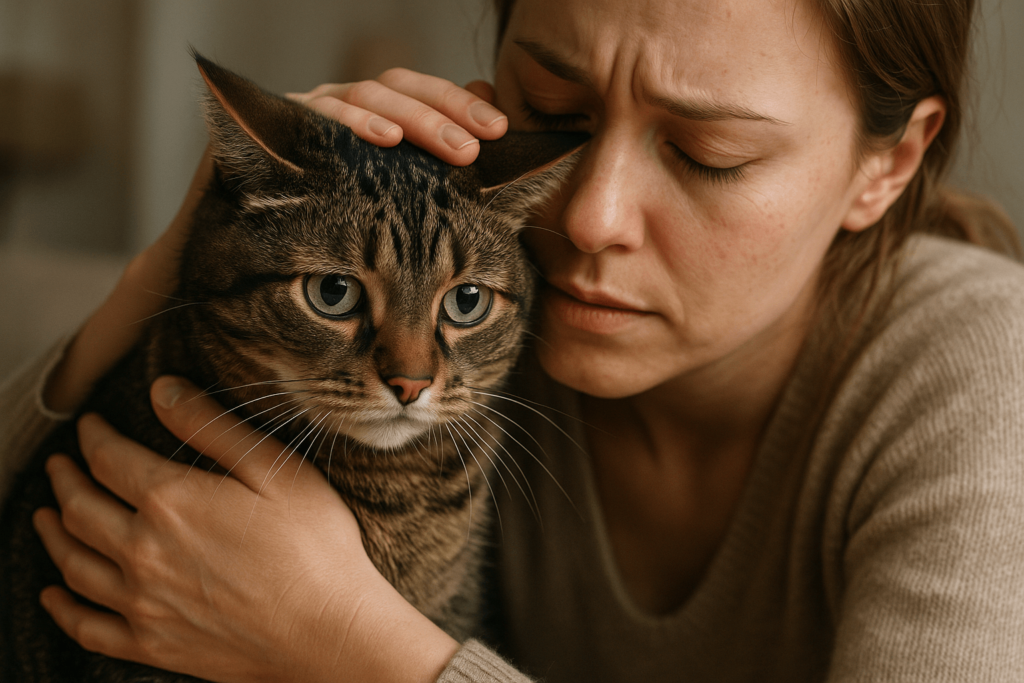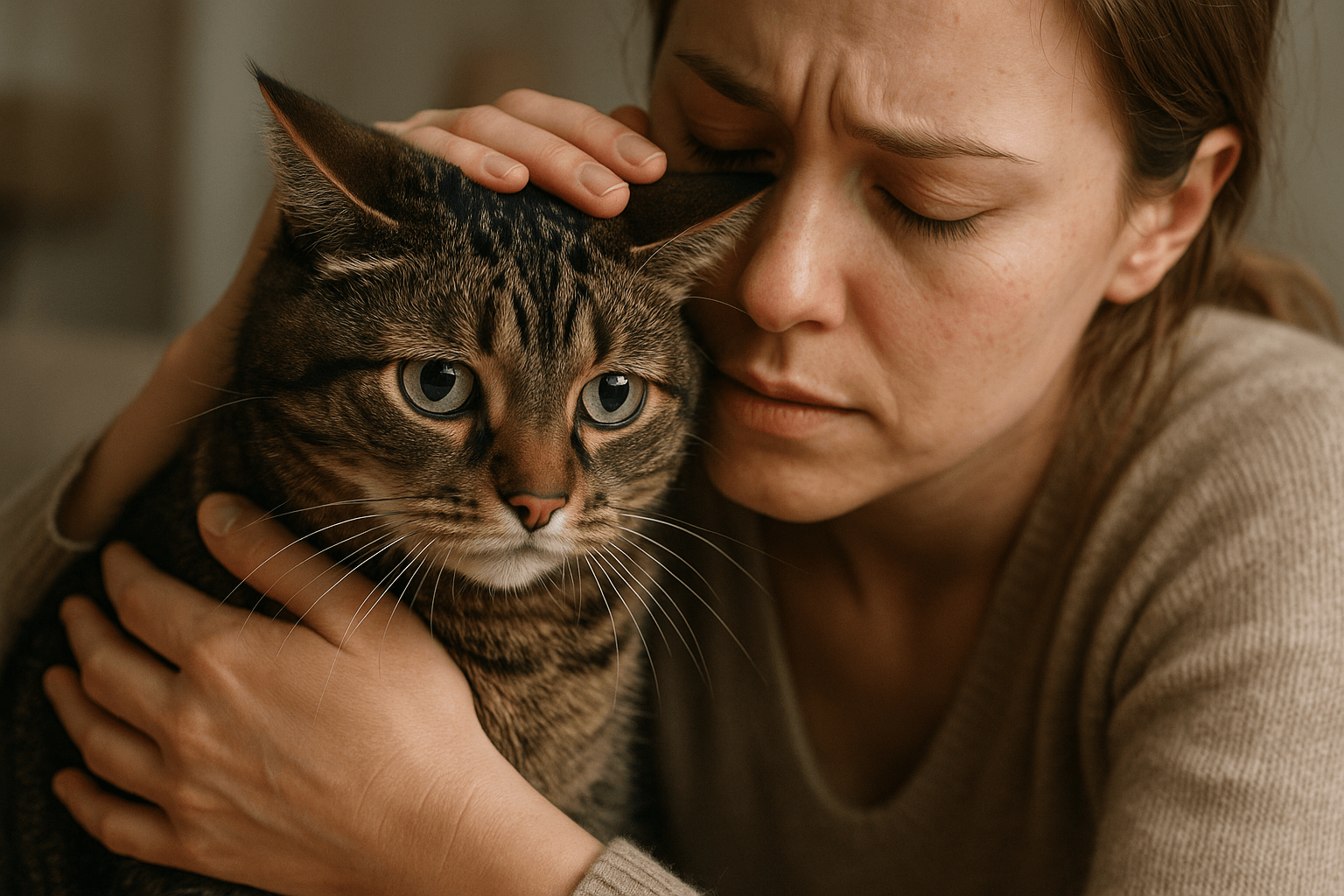How to Deal with Cat Anxiety
Cats are often seen as independent and self-assured creatures, but they can experience anxiety just like humans. Whether it’s triggered by changes in their environment, loud noises, or unfamiliar situations, cat anxiety can manifest in various ways, including excessive grooming, hiding, or aggression. Understanding the root causes of your cat’s stress and learning how to address it is essential for ensuring their well-being. In this guide, we’ll explore practical tips and strategies to help your feline friend feel safe, calm, and content.
Common Signs of Cat Anxiety
Recognizing the signs of anxiety in cats is the first step toward helping them overcome it. These behaviors may vary depending on the individual cat, but some are more common than others.
Excessive Grooming:
Over-grooming can lead to bald patches or skin irritation, often a sign that your cat is trying to self-soothe.Hiding or Withdrawal:
Cats may retreat to secluded areas when feeling anxious, avoiding interaction with people or other pets.Aggression or Irritability:
An anxious cat might lash out with biting, scratching, or hissing, even toward familiar family members.Changes in Appetite:
Some cats eat less when stressed, while others may overeat as a coping mechanism.Vocalization or Pacing:
Increased meowing, yowling, or aimless pacing can indicate heightened stress levels.
By identifying these signs early, you can take proactive steps to alleviate your cat’s anxiety before it escalates further.

Effective Ways to Reduce Cat Anxiety
There are several proven methods to help calm an anxious cat and create a more peaceful environment for them. These strategies focus on providing comfort, routine, and enrichment.
Create a Safe Space:
Designate a quiet area in your home where your cat can retreat when feeling overwhelmed. Include cozy bedding and familiar scents.Use Calming Products:
Items like pheromone diffusers or sprays mimic natural feline calming signals, helping to reduce stress.Stick to a Routine:
Cats thrive on predictability. Maintain consistent feeding, play, and sleep schedules to minimize uncertainty.Provide Mental Stimulation:
Puzzle toys, interactive games, and climbing structures keep your cat engaged and distracted from stressors.Limit Exposure to Triggers:
Identify and reduce exposure to known stressors, such as loud noises, new pets, or frequent household changes.
Implementing these techniques can significantly improve your cat’s emotional state and overall quality of life.
Check this guide 👉Cat Anxiety Symptoms: Best 7 Expert Tips!
Check this guide 👉Cat Separation Anxiety Symptoms: Best 7 Expert Tips!
Check this guide 👉Understanding Cat Anti-Anxiety Medication: Best 7 Tips!
Causes of Cat Anxiety | Solutions to Alleviate Anxiety |
|---|---|
Loud noises (e.g., fireworks) | Use white noise machines or calming music |
Changes in the household | Gradually introduce new elements to reduce shock |
Lack of mental stimulation | Provide puzzle feeders and interactive toys |
Health issues | Schedule regular vet check-ups to rule out medical causes |
Separation from owners | Leave comforting items like clothing with your scent |
How to Help Your Cat Adjust to New Environments
Whether you’re moving homes, introducing a new pet, or rearranging furniture, changes in your cat’s environment can trigger anxiety. Here’s how to ease the transition and help your cat adapt.
Introduce Changes Gradually:
Make adjustments slowly, allowing your cat time to explore and adjust at their own pace.Maintain Familiar Scents:
Keep items like blankets, toys, or bedding that carry your cat’s scent to provide a sense of security.Use Positive Reinforcement:
Reward calm behavior with treats, praise, or playtime to encourage confidence in new situations.Monitor Their Behavior:
Watch for signs of distress and intervene early to prevent anxiety from worsening.Provide Comfort Objects:
Items like soft beds or blankets can serve as comforting anchors during times of change.
By taking these steps, you can help your cat feel more secure and confident in unfamiliar surroundings.
Natural Remedies for Cat Anxiety
If you prefer holistic approaches, there are several natural remedies that can complement traditional methods for managing cat anxiety. Always consult your vet before trying new treatments.
Herbal Supplements:
Ingredients like chamomile or valerian root may promote relaxation without causing drowsiness.Calming Music:
Soft, classical music or specially designed cat playlists can soothe anxious felines.Massage Therapy:
Gentle strokes along your cat’s back or behind their ears can release tension and foster bonding.Essential Oils (Cat-Safe):
Certain oils, diluted properly, can have calming effects, but always ensure they’re safe for cats.Exercise and Play:
Physical activity releases endorphins, which naturally reduce stress and improve mood.
These natural solutions offer gentle ways to support your cat’s emotional well-being.
Managing Separation Anxiety
Separation anxiety is a common issue for cats who form strong bonds with their owners. Helping your cat cope with alone time can strengthen their independence and reduce stress.
Leave Familiar Items Behind:
Place clothing or blankets with your scent near their bed to provide comfort.Create a Predictable Routine:
Establish consistent departure and return times to build trust and reduce uncertainty.Provide Entertainment:
Leave puzzle toys or automated gadgets to keep your cat occupied while you’re away.Avoid Emotional Goodbyes:
Keep departures low-key to avoid reinforcing anxious behavior.Gradual Training:
Practice short absences and gradually increase time away to help your cat adjust.
With these strategies, your cat can learn to feel more secure even when you’re not around.
Addressing Noise-Induced Anxiety
Loud noises, such as thunderstorms or fireworks, can send cats into a panic. Taking preventive measures can minimize their stress during these events.
Create a Soundproof Retreat:
Set up a quiet room with thick curtains or soundproofing materials to muffle noise.Use White Noise Machines:
Background noise can drown out sudden, startling sounds.Desensitize Your Cat:
Gradually expose your cat to recorded sounds at low volumes to help them become accustomed to the noise.Offer Distractions:
Provide engaging toys or treats to redirect their focus during stressful moments.Stay Calm Yourself:
Cats pick up on their owner’s emotions—remaining composed helps reassure them.
By preparing ahead of time, you can protect your cat from the negative effects of noise-induced anxiety.
Preventing Anxiety During Vet Visits
Visiting the vet can be a stressful experience for cats, but there are ways to make it less intimidating and more manageable.
Choose a Cat-Friendly Carrier:
Select a carrier that’s spacious and well-ventilated to ensure comfort during transport.Acclimate Your Cat to the Carrier:
Leave the carrier out at home with treats inside to create positive associations.Practice Car Rides:
Take short trips in the car to help your cat get used to the motion and sounds.Bring Comfort Items:
Pack familiar bedding or toys to provide reassurance during the visit.Reward Calm Behavior:
Offer treats or praise after the appointment to reinforce positive experiences.
These steps can transform vet visits into less daunting outings for your anxious feline.
Frequently Asked Questions About Cat Anxiety
What causes anxiety in cats?
Common triggers include environmental changes, loud noises, health problems, or lack of mental stimulation.
Can cat anxiety be cured?
While it may not always be “cured,” it can be managed effectively with patience, consistency, and proper care.
Are certain breeds more prone to anxiety?
Some breeds, like Siamese or Bengals, may be more sensitive due to their high-energy or vocal nature.
Should I use medication for my cat’s anxiety?
Medication may be necessary in severe cases, but consult your vet to determine the best course of action.
How long does it take for a cat to adjust to changes?
Adjustment times vary, but most cats need a few days to weeks to adapt to significant changes.
Supporting Your Cat Through Anxiety
Dealing with cat anxiety requires empathy, patience, and a willingness to understand your feline companion’s unique needs. By recognizing the signs, addressing underlying causes, and implementing calming strategies, you can create a nurturing environment where your cat feels safe and secure. Remember, every cat is different, so it may take time to find the right combination of techniques that work for your pet. With love and dedication, you can help your furry friend navigate their emotions and live a happier, more relaxed life.
Canned Pumpkin for Cat Diarrhea: Best 7 Expert Tips! Natural remedy to firm stools, soothe upset bellies, and support gut health safely.
Can a Cat Give You Scabies? Best 7 Expert Tips! Discover the truth about feline mites, human skin risks, and how to protect yourself—without panic.
Cat Flea vs Human Flea: Best 7 Expert Tips! Discover the truth about bites, species, and how to eliminate infestations for good.
Weird Cat Behaviors: Best 7 Expert Tips! Discover why cats do strange things—and how to understand, not punish, their instincts for a happier home.





